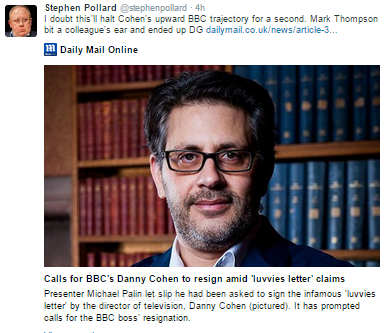I've been keeping half an eye on the ups and downs of the Jewish Chronicle. The FT
reported the situation while it was still unresolved - I can’t give you the date of publication because won’t let me back into the website now - but here’s the excerpt I managed to grab, explaining the way things stood back then:
“The Kessler Foundation, a charitable trust that has owned the Jewish Chronicle since 1984, submitted an offer to the proposed liquidators Begbies Traynor this week, which would have seen them acquire the assets of both publications and run them as a merged publication.
But a rival bid from a consortium through lawyers Osborne Clarke has also been submitted, according to two people familiar with the matter.
The rival consortium is being fronted by former Downing Street head of communications Robbie Gibb, biographer William Shawcross, former Labour MP John Woodcock,
Rabbi Jonathan Hughes of Radlett United Synagogue, and prominent broadcasters John Ware and Jonathan Sacerdoti.”
Most of whom have been featured in this blog - (funny that.) The consortium’s bid was successful and they
reinstated Stephen Pollard as promised.
“………a new consortium moved fast to intervene, and outbid the existing management in order to reinstate Pollard, see the staff right, pay off the debts and secure the future. Headed by Sir Robbie Gibb, a Gentile, the consortium is serious about reinforcing the Jewish Chronicle’s strength rather than shutting it down. Behind all this I detect a battle for leadership in the community. Those who are braver about confronting Islamist anti-Semitism have prevailed over the outdated establishment view that the greater threat to British Jews is from the far right and that Islamists should be appeased in the name of ‘interfaith dialogue’.
The consortium’s victory is good news. It would have been a weird epilogue to the successful exposure of Labour’s anti-Semitism under Jeremy Corbyn if the most prestigious Jewish paper in Europe had then folded. As the general election result proved, the supposedly anti-Semitic white working class saw through Corbyn. The rising danger to Jews — as, though more surreptitiously, to Christians — comes from the alliance between the hard, secular left and political Islam.”
Ah, the last few words open a Pandora’s box of inconvenient and hard to answer questions.
The reason for this post is
simply this. (And it’s even BBC related)
A particularly annoying photo of the BBC’s Fran Unsworth illustrates the piece. In it, she’s looking both startled and extremely pleased with herself all at once.
The issue concerns a knotty problem. How much does political or personal prejudice affect one’s professional credibility? We’re talking about renowned antisemites being invited onto the Beeb to opine about supposedly unconnected matters. Notably but not exclusively, as per that Panorama.
Maybe there’s an element of ‘intersectionality’ here? To what extent does a person’s race, class, and gender prejudice create a unique mode of discrimination dent one’s entire credibility?
Can one’s irrationality in the form of racial hatred - viz “the cognitively dissonant alliance between the hard, secular left and political Islam” be completely divorced from other areas of one’s personality. For example, does it affect one’s expertise in a seemingly unrelated sphere? Does that make sense?
Let’s temporarily forget Professor Ashton, whom Fran Unsworth says is “eminently well qualified to speak about this subject [public health]”. Let’s examine her reasoning, by using a more extreme example like, say, the late Stephen Hawking.
Stephen Hawking was so highly regarded as a theoretical physicist, cosmologist and author that his reputation as such is untouchable and sealed forever. But even he fell foul of pressure from the hard, secular left and political Islam in his irrational decision to join the academic boycott of Israel by rejecting an invitation to attend a conference there (despite relying on Israeli sourced technology to help keep him alive.) That was just common or garden hypocrisy, but we’re not concerned with that at the moment.
The conference, called “Facing Tomorrow 2013,” is billed as a meeting place for exploring the developments shaping the future of Israel, the Jewish people and the world. Its program includes former heads of state, academics, artists and business executives. Former President Bill Clinton is to receive an award from Mr. Peres.
Also listed among the speakers is Munib al-Masri, a Palestinian tycoon from the West Bank city of Nablus who has been working to promote internal Palestinian reconciliation.
If that is indeed an accurate description of the event that Hawking boycotted, doesn't the decision to boycott it look a bit stupid and ill-conceived? It does to me.
However, as I know quite a bit more about factually and historically illiterate antisemitism than I do about theoretical or any other kind of physics, all I can possibly ask is ‘does a specific demonstration of irrationality and prejudice dent one’s whole credibility? A little bit? Not at all? Does stupidity, prejudice and irrationality run through one like the proverbial stick of rock?
What I do know is that Stephen Hawking’s and professor John Ashworth’s reputations are seriously flawed in the eyes of this non-expert, and as far as Fran Unsworth's reputation is concerned, wheeling out the ‘Freeze Peach’ argument certainly dents the remaining dregs of it.
The issue here is that while antisemitism under the accepted definition is not actually illegal, and we don’t want to create a bespoke version of a blasphemy law to make it so, what can most effectively be done to show disgust and disapproval where anti-Jew prejudice raises its head?
For the BBC, maybe keeping known antisemites out of the limelight would go along with the spirit of the zeitgeist. However, as we’ve been saying for the last umpteen years, the BBC is not minded to keep antisemites out of the limelight. The BBC has tacitly taken the side of the antisemites and promotes the hard, secular left and political (and particularly cultural) Islam at every opportunity. It has made antisemitism a political choice and it’s not afraid to say so.






















